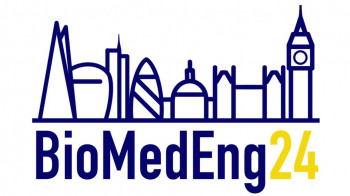News
Queen Mary University of London brings together national multi-disciplinary leaders at BioMedEng24
Centre for Bioengineering Faculty of Science and Engineering9 August 2024
On the 5th and 6th of September this year, Queen Mary University of London's School of Engineering and Materials Science will host the 16th BioMedEng conference, welcoming over 400 Biomedical engineers, researchers, clinical specialists, government and industry representatives.
The BioMedEng annual conference is the UK's largest gathering of Biomedical Engineers, Medical Engineers and Bioengineers, with expertise in medicine, science and engineering.
A world-leading institution for Biomedical Engineering for over 50 years, Queen Mary is home to the Centre for Bioengineering and the Centre for Predictive In-Vitro Models. The hosting School of Engineering and Materials Science is ranked seventh in the UK for research (REF 2021). The school has recently been awarded a £7 million grant to establish an EPSRC Centre for Doctoral Training (CDT) in Next Generation Organ-on-a-Chip Technologies, which will train future leaders in the rapidly expanding field of organ-on-a-chip technology.
Professor Martin Knight, Chair of the BioMedEng Council and Dean for Research of the Faculty of Science and Engineering, Queen Mary University of London, said:
"Queen Mary University of London was one of the first institutions to offer bioengineering and biomaterials undergraduate degrees, and now has one of the biggest bioengineering groups in the country, with expertise in biomaterials, mechanobiology, healthcare robotics, AI and pioneering organ-chip technology.
"BioMedEng24 will be a platform where the brightest minds in biomedical engineering come together to share groundbreaking research and innovations, driving the future of medicine through technology."
Professor Hazel Screen, a leading figure in organ-on-a-chip technology at Queen Mary University of London, said: "At Queen Mary we believe diversity is key to unlocking innovation, and we strive to ensure new technologies benefit everybody. The creation of the EPSRC CDT at Queen Mary University of London is testament to our impressive organ-on-a-chip research. This technology is truly paving the way for more effective treatments and a deeper understanding of human biology."
Queen Mary is committed to Equality, Diversity and Inclusion, and BioMedEng24 will showcase the diversity of talent in the Biomedical industry. The School of Engineering and Materials Science has had their Athena Swan Bronze award renewed for a third time this year. 56% of keynote speakers at this year's conference are women and the school is further demonstrating this commitment to gender equality in the conference programme, with a special symposium on Women and Child Health.
Conference highlights
Plenary Speaker
- Professor Dame Molly Stevens, University of Oxford, Imperial College London: New Bioengineered Materials for Advanced Therapeutics and Ultrasensitive Biosensing.
The John Black Professor of Bionanoscience talks about her work balancing the investigation of fundamental science with the development of technology to address some of the major healthcare challenges, and her portfolio of designer biomaterials for applications in disease diagnostics and regenerative medicine.
Plenary Debate: Transforming Technology for Future Medicine
- Professor Martin Knight (Chair of BioMedEng Council, Dean for Research of the Faculty of Science and Engineering) – Debate Chair
- Professor Alvaro Mata (University of Nottingham) – Bioinspired Materials
- Dr Anne Vanhoestenberghe (King's College London) - Implantable Electronics
- Professor Matthew Dalby (University of Glasgow) - Nanotechnology to control cell behaviour
- Professor Hazel Screen (QMUL) - Organ-on-a-chip Technology
- Ms Jane John-Lewis (Intuitive Surgical) - Robotic Surgery
- Dr Anna Barnes (King's College London) - AI for health and clinical translation
Dinner speech: Professor Karen Salt, UK Research and Innovation
- Professor Karen Salt is currently the Trusted Research and Innovation Portfolio Director within UK Research and Innovation (UKRI). She is also Professor of Culture, Place and Communities at Manchester Metropolitan University. A specialist in governance and complex systems, Salt has had numerous advisory, consultative and research leadership roles across the sector.
BioMedEng24 is supported by the following partners:
- Ansys
- Optics11
- British Heart Foundation
- Nikon
- Fluigent
- Cellink
- The Company of Biologists
- Rheolution
- Materialise
- LaVision
- Animal Free Research UK
- RSPCA UK
- Calla Lilly Clinical Care
Find out more about the programme on the BioMedEng24 website.
Updated by: Ilyana Zolotareva





